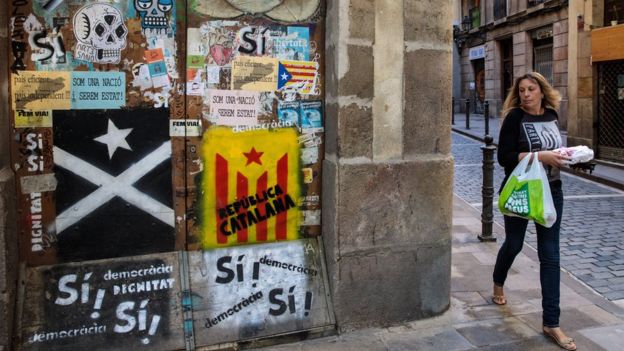Catalan authorities will not follow orders from the Spanish government if Madrid moves to reassert control over the region, a senior official says.
Foreign affairs spokesman Raul Romeva told the BBC the central government was acting against the will of Catalans.
Spain's Prime Minister Mariano Rajoy has announced plans to sack the region's government and curtail some of the freedoms of its parliament.
The Catalan parliament will meet on Thursday to decide on its response.
The Spanish Senate is expected to approve the government's measures on Friday along with a proposal for fresh regional elections.
How did we get here?
The Catalan government, led by President Carles Puigdemont, has refused to halt an independence drive following an outlawed referendum held earlier this month.
 |
| Pro-independence posters and graffiti in Barcelona |
On Saturday, Mr Rajoy said he was triggering Article 155 of the constitution - an unprecedented move - which allows for direct rule to be imposed in a crisis on any of the country's autonomous regions.
But Catalan leaders say they will not accept the plan.
Mr Romeva said: "How can the European Union live with that situation [if this happens]? How can the EU democracy survive and how can they be credible if they allow this to happen?
"Because what I can tell you is that the people and the institutions in Catalonia will not let this happen."
He said the Spanish government needed to recognise that the people of the region had voted for independence.
Catalonia independence: Spain's unfathomably delicate task
Spain Catalonia: Foreign minister denies 'coup' by Madrid
The Catalan government said that of the 43% who took part in the 1 October referendum, 90% were in favour of independence.
Unionist parties who won about 40% of the vote at the 2015 Catalan elections boycotted the ballot and many anti-independence supporters stayed away, arguing it was not valid.
What happens next?
Apart from stripping Carles Puigdemont of all his powers, the central government will also seek to take control of Catalonia's local police force and its public broadcaster, TV3, reports suggest.
Mr Rajoy insisted his government's measures would not mean Catalan self-government itself was being suspended and that they were intended to remove the people who had taken the government outside the framework of the law.
The country's Deputy Prime Minister, Soraya Sáenz de Santamaría, told Spanish radio Onda Cero (in Spanish): "They [Catalan leaders] haven't been put in the role by some divine power, they've been put in their roles by the constitution and the statute of autonomy.
"They're completely not in compliance with the constitution and the statute of autonomy... They may be living in some other reality but the political and legal reality is that they will be removed."
Once the Senate approves Article 155, Mr Puigdemont will stop receiving a salary and will not be able to carry out his functions or make any valid or obligatory decisions, she added.
Appeals by separatists for outside intervention in the crisis have had little effect, with the EU taking the position it is an internal affair for Spain to decide.
Meanwhile, Catalonia's pro-independence leaders could decide to use the regional parliament to formally declare independence, the BBC's Bethany Bell in Barcelona reports.
Source: BBCNews

